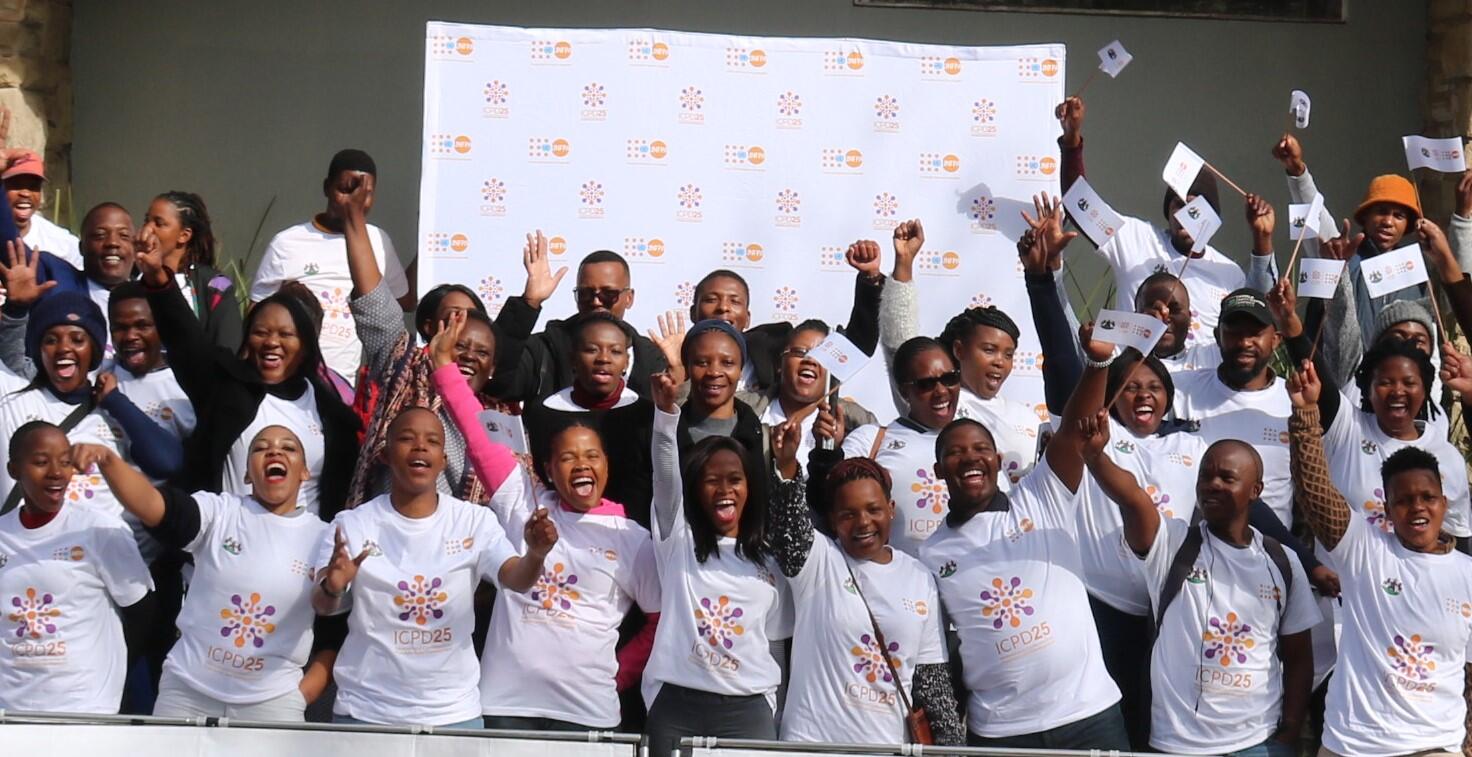Young people of Lesotho signed a commitment on accelerating the implementation of the International Conference on Population and Development (ICPD) Program of Action of 1994, during the Lesotho Youth Dialogue on ICPD held on the 5th July 2019 in Maseru.
The Youth commit to; ensuring that no woman or girl dies from Preventable Maternal Deaths by 2030, Zero New HIV Infections among young people, access to Sexual and Reproductive Health Services and Rights, Zero tolerance to Gender Based Violence, attainment and realization of their rights and choices. They vouched to holding themselves accountable for the implementation of the commitment and demanding accountability from duty bearers.
The event attracted diverse groups of young people including young people with disabilities, LGBTIQ+, adolescents, sex workers and young health professionals. The highlight of the event was a panel discussion on “what has changed” and the “unfinished business” that culminated in the signing of the Lesotho Youth commitment to accelerating the ICPD promise: The road to Nairobi.
On “what has changed”, the young people from their different sectoral representation, applauded the Government of Lesotho for making significant progress in Sexual and Reproductive Health and Rights for Basotho young people. Representing adolescents in schools, Thato Nchephe, a 12 years old girl applauded the Ministry of Education and Training for introducing and implementing Comprehensive Sexuality Education in schools and requested adolescents and young people to make use of the content and information that the subject offers.
Thabo Letsapo, also highlighted that the subject is teaching them about their sexuality and adolescent development, and also help them to understand and prevent teenage pregnancy and child marriage in schools. The adolescents called for their peers to take advantage of the subject to gain knowledge and skills to improve their sexual behaviours.
Putting the lens on “what has changed”, Neo Kabi representing the LGBTIQA+ highly commended the government of the Kingdom of Lesotho for recognizing the LGBTIQA+ community in Lesotho. “The LGBTIQA+ can now access Sexual and Reproductive Health commodities including lubricants without discrimination,” she stated. This was echoed by Jerry Lehloka, a young person from the LGBTIQA+ community who added that there are services tailored for key populations which are responding to the high HIV prevalence among key populations. He also applauded the government for making progress in acknowledging key populations (LGBTI and Sex Workers) and the need for investment in these groups in its 2019/2020 budget speech. This was over and above acknowledging their existence in the HIV Policy 2019 and the HIV/AIDS National Strategic Plan 2018/19 -2023.
From Young People with Disabilities, Refiloe Makhutla also indicated that there has been commendable progress for young people with disabilities as there are health facilities that are accessible for them.
On the other hand, Mamello Makhele, a young health professional from She Decides, also congratulated the Government of Lesotho for making remarkable progress in reducing maternal deaths from 936/100 000 live births to 618/100 000 live births. In addition, she applauded Lesotho on reduction of the unmet need for family planning which has dropped by 5% from 23% to 18% and the Contraceptive Prevalence Rate (CPR) which increased by 13% from 47% to 60%. She noted that skilled birth attendant has also increased from 55% to 78% while facility-based deliveries have increased from 52% to 77% (Lesotho Demographic Health Survey, 2014).
The dialogue took into consideration contributions from other young people who highlighted that removing the tax on sanitary towels by the government would go a long way in reducing menstrual health stigma and help adolescent girls not to miss school during their monthly periods.
On “the Unfinished Business,” Basotho young people acknowledged to a large extend progress made by the country despite challenges that young people are still facing. Young people with disabilities lamented on the discrimination and stigma they encounter in relation to sexual and reproductive health. One of them Lisebo Phahla said, “if I have disability, people think I cannot practice any sexual activities, we are not regarded as sexual beings, as such we receive humiliation from the society and health provider,” she stated. Her words were echoed by Refiloe Makhutla who added that for those with hearing impairment, the “doctor –patient” confidentiality is compromised, and therefore becomes a barrier for people with disability to access HIV Testing and Services as well as contraception as there is still taboo and privacy attached to such services particularly for young people.
Although the health facilities are accessible to young people with physical disabilities, the country topology and the distance between villages and health facilities still becomes a barrier. As such, young people with disabilities appealed to the government to provide SRHR information in all different formats to allow inclusion of young people with visual and hearing impairment.
The young people also noted that despite the reduction in maternal mortality, the rate at which women and girls still die due to pregnancy complications is still alarming. They also expressed concern of the high rate of teenage pregnancy, child marriage and HIV prevalence among young people.
They also acknowledged legal frameworks that the country have put in place, however they mentioned that key laws that are meant to protect adolescents and young people are still pending and are not implemented.
Having deliberated on the “what has changed” and “the unfinished business”, the young people of Lesotho committed to 15 key milestones ahead of the ICPD Nairobi summit.



